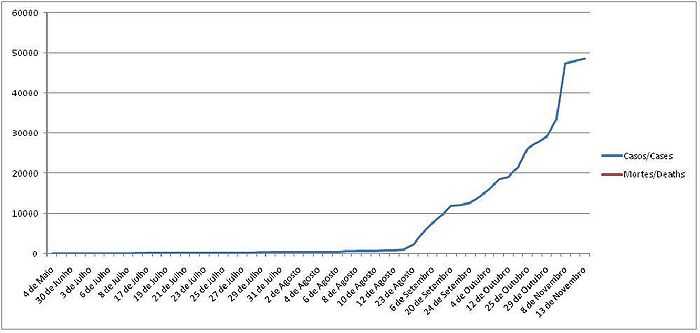2009 flu pandemic in Portugal

As of 4 May, there has been one confirmed case in Lisbon, Portugal, but it did not represent any concern, because the risk of transmission was no longer present at that time.[1]
On 1 June, Ana Jorge, the Portuguese Health Minister, has confirmed the second case in Portugal, a 33-year-old man who travelled from the United States, first landing in Frankfurt, Germany. The case was reported at São João Hospital, Oporto.[2] On 30 June, five new cases were announced in Portugal elevating the total number of cases to 18.[3]
As of 2 July there have been 27 confirmed cases in Portugal.
On 3 July, 6 more cases were reported, making a total of 33 cases. As of 4 July, more 5 cases were confirmed, two of them internal transmissions (one in Azores, and the other one in Lisbon).
On 6 July, there have been confirmed 48 cases in Portugal.
As of 7 July, another 12 people infected were confirmed, making a total of 57 cases in the country. On this day, the first school was closed down for prevention, in Lisbon, as well as a kindergarten in Azores.
On 8 July, 4 more cases were confirmed, including the first in Braga district, making the total cases 61.
As of 14 July, there are a total of 96 confirmed cases in Portugal.[4] On this day, it was also announced that Faro's Hospital will join, on 15 July, the set of hospitals in the country capable of receiving patients infected with the A/H1N1 flu virus.[5]
Government officials state the worst-case scenario in Portugal is 25% infection with a mortality of 0.1% totaling 8700 casualties in Portugal.[6]
On July 17, 10 more cases were confirmed, making a total of 121 cases in the country.
On July 18, 9 more cases were confirmed, making a total of 130 cases in the country.
On July 19, 10 more cases were confirmed, making a total of 140 cases in the country.
On July 20, 14 more cases were confirmed, making a total of 154 cases in the country.[7]
On July 21, 7 more cases were confirmed, making a total of 161 cases in the country.
On July 22, 13 more cases were confirmed, making a total of 174 cases in the country.
On July 23, 14 more cases were confirmed, making a total of 188 cases in the country.
On July 24, 10 more cases were confirmed, making a total of 198 cases in the country.
On July 25, 20 more cases were confirmed, making a total of 218 cases in the country.
On July 26, 14 more cases were confirmed, making a total of 232 cases in the country.
On July 27, 7 more cases were confirmed, making a total of 239 cases in the country.
On July 28, 9 more cases were confirmed, makîng a total of 248 cases in the country.
On July 29, 17 more cases were confirmed, making a total of 265 cases in the country.
On July 30, 7 more cases were confirmed, making a total of 272 cases in the country.
On July 31, 23 more cases were confirmed, making a total of 295 cases in the country.
On August 1, 15 more cases were confirmed, making a total of 310 cases in the country.
On August 2, 10 more cases were confirmed, making a total of 320 cases in the country.
On August 3, 22 more cases were confirmed, making a total of 342 cases in the country.
On August 4, 27 more cases were confirmed, making a total of 369 cases in the country.
On August 5, 32 more cases were confirmed, making a total of 401 cases in the country.
On August 6, 44 more cases were confirmed, making a total of 445 cases in the country.
On August 7, 32 more cases were confirmed, making a total of 477 cases in the country.
On August 8, 28 more cases were confirmed, making a total of 505 cases in the country.
On August 9, 49 more cases were confirmed, making a total of 554 cases in the country.
On August 10, 53 more cases were confirmed, making a total of 607 cases in the country.
On August 11, 76 more cases were confirmed, making a total of 683 cases in the country.
On August 12, 52 more cases were confirmed, making a total of 735 cases in the country.
On August 13, 149 more cases were confirmed, making a total of 884 cases in the country.
On 13 September 2009, Portugal had 9618 cases officially confirmed.
As of 28 October, there are four deaths: two men, one woman and one child, and more than 25 thousand cases confirmed.
As of 4 December, there were 121,677 cases confirmed and 24 deaths.
References
- ↑ "Confirmado primeiro caso de Gripe A em Portugal - PUBLICO.PT". Archived from the original on 2009-09-10. Retrieved 2009-08-06.
- ↑ "Second case of swine flu in Portugal". Archived from the original on 2009-09-10. Retrieved 2009-08-06.
- ↑ "Gripe A: Confirmado o 18º caso em Portugal | Saúde | Diário Digital". Diariodigital.sapo.pt. Retrieved 2012-12-01.
- ↑ "Noticias online em tempo real". Jornal Digital. 2009-07-14. Retrieved 2012-12-01.
- ↑ "Hospital de Faro junta-se amanhã às unidades de referência para a gripe A - PÚBLICO". Ultimahora.publico.clix.pt. 2009-07-14. Retrieved 2012-12-01.
- ↑ "Pesquisa SAPO". dn. 2009-12-06. Retrieved 2012-12-01.
- ↑ "Gripe A: Portugal com mais de 150 casos - TVNET.PT". Tvnet.sapo.pt. 2009-07-20. Retrieved 2012-12-01.